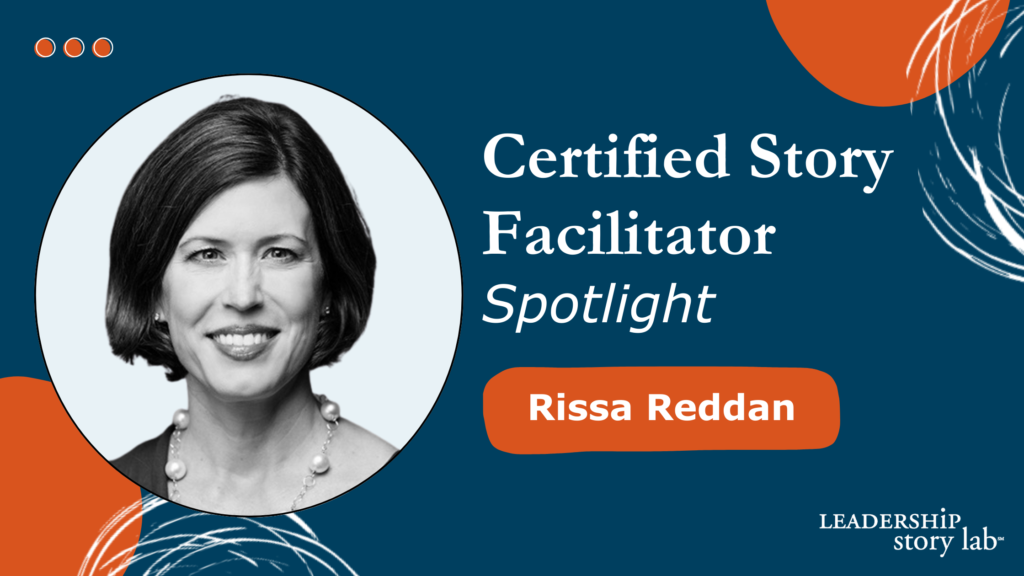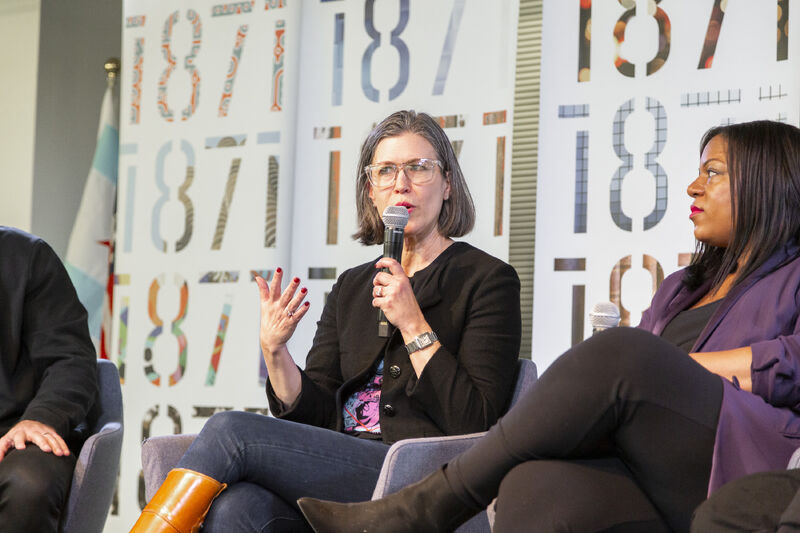April 7, 2025 / Leadership Story Lab
 Marketing is often described as one part art and one part science. Rissa Reddan was born on the Upper West Side of Manhattan to a father who holds a Ph.D. in inorganic chemistry and a mother who is an artist with perfect pitch. She is literally one part art and one part science. And marketing has always been a great fit for her. With experience as a 3x Chief Marketing Officer, she is now a consultant serving as a fractional CMO, helping clients grow their businesses with a focus on brand building, marketing strategy and planning, and strategic introductions.
Marketing is often described as one part art and one part science. Rissa Reddan was born on the Upper West Side of Manhattan to a father who holds a Ph.D. in inorganic chemistry and a mother who is an artist with perfect pitch. She is literally one part art and one part science. And marketing has always been a great fit for her. With experience as a 3x Chief Marketing Officer, she is now a consultant serving as a fractional CMO, helping clients grow their businesses with a focus on brand building, marketing strategy and planning, and strategic introductions.
We loved getting a chance to catch up with Rissa to learn how storytelling plays a significant role in her day-to-day work leading marketing teams. Here’s our conversation, lightly edited.
LSL: Why is storytelling important in marketing?
Rissa: We have opportunities to tell stories all the time, and often we don’t take full advantage. When you do make the time to tell the story, it’s so much more fun for you as well as for those around you. Don’t we all want a little bit more fun right now?
When I was at PwC, I worked with a lot of partners who were very technical and they were promoted because of their technical ability. When they became partners, they were expected to sell. They would introduce themselves with a list of facts, “I have a CPA in this state. I’ve been doing this work for 25 years. I graduated from University of Illinois. I work with a variety of clients.”
It was so boring. Instead, why don’t you tell me what it is you love about this problem that you solve? Or tell me about a problem that you recently solved with a client that’s similar to the work that we’re pitching right now?
I don’t mean to diminish somebody’s credentials, but if you’re the client, why does that matter? Anytime people bring their character forward, they create an opportunity for greater connection and a better conversation. For example, “I coach my kids Little League, and the things that I’m coaching them on relate to business in these five ways.” That’s a much more interesting introduction. You’ll get questions, “How old is your kid?” And “How do you like coaching?” We have these opportunities to create connections and create opportunities for follow up questions.
When you spew out the facts and figures, I think it’s a missed opportunity. Some people feel uncomfortable with taking a story-based approach. But if you can get somebody to try it once, there’s a good chance it’s going to create a different conversation. And that will lead to a greater likelihood that they will take a story-based approach next time.
LSL: How did you learn about Leadership Story Lab? How did you know storytelling was a skill you wanted to invest in as a marketer?
Rissa: I first encountered Esther at Kellogg during a session she was leading. It was interesting to me on a variety of levels, both the people that she attracted to the session, but also the content of the session. I mean, I can still remember the story she told that night — why storks are associated with babies. She was very captivating. The people were so into it, and that’s been something that’s been really interesting to me.
I’ve seen Esther speak subsequently. People are at first thinking, what is this? Am I going to enjoy this? And then they’re super engaged. That has been my experience consistently from seeing her in action. People are just captivated by this topic and by the opportunity to connect in a really meaningful way.
I like to describe marketing as one part art and one part science. You might think storytelling is the art side, but I think it’s actually both. How do you use data to tell a story, or how do you craft a compelling narrative. It hits on both sides of that equation.
I’ve also been involved with sales and big pursuits, and something as simple as how you introduce yourself can be really important. And I love Esther’s focus on powerful introductions. It helps people understand who you are and what you’re about. I quote Esther all the time about how people really crave character. She really helps people bring that forward in a way that it makes sense — I’m telling you who I am and why it’s relevant to this context or the business circumstances.
LSL: Why did you decide to participate in our Certified Story Facilitator (CSF) training? What sets it apart from other professional development training?
Rissa: I wanted to hone my skills, my craft in storytelling. For me it was important to have the structure of the training sessions. You can read the book. You can watch things online, but I think the interactive session puts you to the test. It forces a different level of mastery. I liked having to show up. I liked having a partner who was depending on me.
CSF is so interactive. It’s so much more fun. So much of corporate training and — this is a generalization — but so often the facilitator tees up the session and says, “we’re going to make this interactive,” and then they talk at you for a couple of hours.
I’m reminded of a CMO conference that I went to years ago. It was on storytelling when storytelling was a little bit newer of a topic for marketers. It was five marketers on the stage talking about the importance of storytelling. Not one of them told a story. And I’m like, Well, how can you talk about storytelling without telling an actual story? That just doesn’t make any sense to me. So I think people now generally will agree that storytelling is a good idea, but that’s different than telling a story.
There is something really experiential about CSF that is not present in all corporate training. Then, in this day and age of on demand, or compliance training, mandatory training, CSF has a very different feel to it. It’s a lot more fun, but yet you’re learning a ton.
CSF goes beyond theory, and requires participants to fully immerse themselves with their own narratives and those of their peers. Participants are guided through storytelling exercises and then facilitate sessions to build skills in storytelling and group facilitation. Every session, participants are both storytellers and leaders providing feedback to sharpen their skills.
LSL: How did the training impact the way you see or understand your role at work or elsewhere.
Rissa: I think a key part of being a marketing leader is being compelling. If you cannot be compelling as an individual, how can your marketers be compelling? And how do you help people see the value of the service or the product that you offer?
It’s important to model what you want to see others do. As a marketer, you need to be able to persuade. Whether that’s a budget conversation with your CEO or helping a prospect understand what your company does, you’re always trying to clearly communicate. But not just clearly communicate. How do you hook people? How do you try to be as irresistible as possible? I think that you can’t be irresistible without a story.

Rissa is part of a speakers collective called Thrive, sharing stories and career insight for Employee Resource Groups.
LSL: So in all these different business scenarios, it’s figuring out how to include the irresistible story?
Rissa: Yes, that’s right. The marketer’s role is to drive business results. You need to connect with prospects and clients in meaningful ways. Storytelling is a helpful tool in that toolbox to bridge that gap or to make that connection or to to attract new people.
Read about how Rissa defies convention and incorporates storytelling into team meetings to help people pause and connect before digging into agenda items.
LSL: When have you implemented something you learned at CSF?
Rissa: I’ve brought in Reena and Esther to work with my teams. When I was a new CMO at PayNet which was acquired by Equifax, I brought Esther in to do a storytelling workshop for the marketing and sales teams. I felt like all of our marketers and sellers need to be well versed and it will set the tone for the rest of the company. It was a great team building activity, but it was also a great baseline. Now everybody’s expected to tell better stories.
LSL: Have you facilitated storytelling yourself?
Rissa: I did a session with West Monroe’s Washington, DC office, using the Paired Introduction workshop. At first they wondered, “What is this? Why would I do this?” But people go from skeptics to believers pretty quickly. When they have a chance to get to know one another better and apply an approach or a framework to introductions it’s great.
Paired Introductions is the signature exercise that participants master in CSF Level 1, focusing on active listening and the power of asking Crazy Good Questions to help write an intriguing introduction that can be used in conferences, meetings, bios and other professional and personal introduction opportunities.
As we think about return-to-office and the whole movement of encouraging people to be in the office we have to think about — to what end? for what purpose? The paired introduction is a nice way for people to get to know one another. We’ve moved through this period of incredible isolation. Storytelling helps people to connect in a way that they haven’t been able to connect. I think it was a really nice opportunity for people to get to know one another and build relationships in a way that makes coming into an office more meaningful.
LSL: What has surprised you the most about story facilitation?
Rissa: Anybody can tell a good story.
I think that there’s a belief that you have to be a natural storyteller. And I’m sure that there are plenty of examples of people who are sort of these natural storytellers. But as with anything, it takes practice and it takes discipline, and following a framework and thinking through what you’re about to say. But I think it’s something that anybody can learn if they have a desire to do so.
LSL: So how often do you use storytelling in your day to day as a fractional CMO?
Rissa: Lots. I’m thinking of a project that I just completed. It was a marketing strategy for a client. And, I put into the marketing strategy that they need to think about storytelling. As we think about a marketing program, brand, it’s also messaging. How do we tell the stories of client success?
And so in the plan, I recommended a workshop with Esther or Reena on how to ensure that the content is compelling before it gets distributed out through social media, digital advertising. At the heart of it, how are we telling those stories of success?
Storytelling is something that I started doing later in my career. Part of it is Esther and part of it is having more confidence as an older person. Every presentation I think needs to lead with the story.
LSL: You mentioned that you are more confident as a person further along in her career? Is confidence tied to storytelling?
Rissa: I remember the first time telling a story. It was in a job interview, and it was something that Esther had me talk about in an article for the American Marketing Association. But it was one of those moments, “Gosh, am I really going to do this?” Because this is so out there.
You do it once, and then you do it twice and three times, and then you become more confident. Now I have more of a reputation. People ask, what’s the story we’re going to hear at the beginning of your presentation?
So I think the most difficult part is taking that first leap. The first time I told a story, it worked out, and I got the job. But it’s not always going to go so swimmingly. You’re probably not always going to land it, but the more you try it, the more you’re gonna learn what’s going to work and what’s not going to work.
As with anything, the more you practice it, the more comfortable you get.
—
We are continually inspired by the way Rissa has incorporated storytelling as a part of her everyday life and a superpower in marketing. If you want to get more comfortable and confident in storytelling, join us for Story Lab. It’s a complimentary session where you can learn the storytelling frameworks, test new ideas and receive constructive feedback.
Related Articles
Financial Storytelling: How To Make Sense Of The Numbers
A Better Way To Lead Your Team Through Change: Leadership Storytelling
Better Every Story
"This is an amazing and insightful post! I hadn’t thought of that so you broadened my perspective. I always appreciate your insight!" - Dan B.
Join the thousands who receive Esther Choy’s insights, best practices and examples of great storytelling in our twice monthly newsletter.



